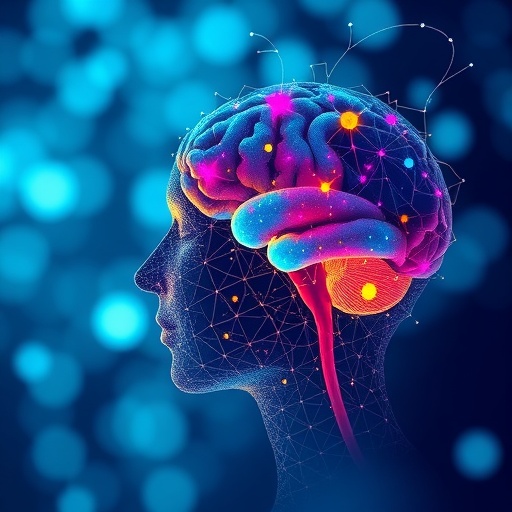In a groundbreaking new study published in Translational Psychiatry, researchers have unveiled a complex genetic framework that shapes the interplay between psychosis and cognitive function. This research illuminates how polygenic scores—cumulative indices derived from multiple genetic variants—mediate cognitive outcomes in individuals experiencing psychosis, marking a significant advance in the field of psychiatric genetics and offering fresh avenues for personalized medicine.
Psychotic disorders, characterized by distorted perceptions and impaired reality testing, are often accompanied by cognitive deficits that complicate prognosis and treatment. The intricate relationship between cognition and psychosis has long puzzled scientists, with many investigations focusing on environmental and neurological factors. However, this study pivots the focus towards the genetic architecture underlying these phenotypes, emphasizing that genetic predisposition substantially modulates cognitive impairments linked to psychosis.
Utilizing large-scale genomic data alongside comprehensive neuropsychological assessments, the research team calculated polygenic scores for psychosis risk and cognitive ability in a diverse participant cohort. These polygenic scores aggregate the risk alleles identified across genome-wide association studies, providing a quantitative measure of inherited susceptibility. By comparing these scores with participants’ cognitive performance, the study uncovered nuanced patterns of genetic influence that transcend traditional diagnostic categories.
One of the pivotal revelations is that higher psychosis polygenic scores correlate significantly with lower cognitive performance, reaffirming the hypothesis that genetic liability to psychosis intrinsically compromises cognitive function. Intriguingly, this correlation persists even when controlling for clinical symptom severity, suggesting that genetic factors shape cognitive deficits independently of acute psychotic episodes. This insight challenges conventional clinical perspectives that often isolate cognitive symptoms as secondary or consequence of psychosis.
Furthermore, the team discovered that cognitive polygenic scores inversely modulate the severity of psychosis symptoms. Essentially, individuals genetically predisposed to better cognitive functioning exhibited milder psychotic symptoms, hinting at a protective genetic effect. This bidirectional genetic interdependence emphasizes the complex genomic interplay governing brain function and mental health, and advocates for integrated models rather than siloed genetic risk assessments.
The methodology employed brings robust statistical techniques to the forefront. By leveraging multivariate regression models and controlling for confounders such as age, sex, and population stratification, the researchers ensured the reliability and generalizability of findings. Moreover, the incorporation of polygenic scores from expansive consortia enhances the study’s genetic resolution, capturing a broad spectrum of common variant effects rather than isolated candidate genes.
Delving deeper, the study explored the genetic correlation coefficients between psychosis and cognition, revealing moderate yet significant inverse relationships. This suggests overlapping genetic variants generate pleiotropic effects—simultaneously influencing the risk for psychosis and cognitive abilities. Identifying these shared genetic loci may unlock therapeutic targets that modulate cognitive resilience in psychosis, a transformative stride toward mitigating the disabling aspects of these conditions.
The dataset also included longitudinal cognitive assessments, thereby enabling an examination of developmental trajectories. Significantly, individuals with elevated psychosis polygenic scores showed early-life cognitive deficits, often preceding clinically detectable psychotic symptoms. This temporal precedence offers compelling evidence that cognitive impairments are not mere epiphenomena but integral features embedded in the genetic risk architecture of psychosis.
Importantly, this research transcends mere academic inquiry, bearing profound clinical implications. Polygenic risk profiling could enhance early identification of individuals at heightened risk for cognitive decline in psychosis, enabling preemptive interventions tailored to genetic profiles. Such precision psychiatry could revolutionize treatment paradigms, shifting from symptom management to proactive neurocognitive support and even preventive care.
Additionally, the findings underscore the necessity of integrating genetic counseling into psychiatric practice. Understanding a patient’s polygenic risk landscape might guide clinicians in selecting cognitive remediation strategies or adjunctive therapies more likely to yield benefit, fostering individualized care plans grounded in genetic data rather than broad diagnostic categories alone.
The study’s implications ripple beyond psychosis, offering a framework applicable to diverse neuropsychiatric disorders marked by cognitive deficits, such as bipolar disorder, major depressive disorder, and autism spectrum conditions. Recognizing that polygenic contributions influence cognitive phenotypes may spur a new wave of cross-disorder genetic analyses, catalyzing breakthroughs across mental health disciplines.
However, the authors also acknowledge limitations that temper the findings. Polygenic scores capture only a fraction of heritable risk, with rare variants, gene-environment interactions, and epigenetic modifications remaining elusive factors requiring further research. Moreover, the complexity of cognitive phenotypes defies simplistic genetic explanations, necessitating multifaceted investigations combining genomics with neuroimaging, proteomics, and environmental data.
Ethical considerations emerge as another focal point. The prospect of using polygenic scores for predictive purposes raises questions about privacy, potential stigmatization, and equitable access to genetic testing. The researchers advocate for rigorous ethical frameworks accompanying clinical implementation, ensuring that genomic advances serve to empower rather than marginalize vulnerable populations.
In conclusion, this study represents a landmark achievement in elucidating the genetic interrelations between psychosis and cognition. By decoding the influence of polygenic risk scores, it charts a path toward more nuanced understanding and management of psychiatric conditions. As the field moves forward, integrating polygenic insights with clinical practice promises to transform mental healthcare into a domain defined by precision, prevention, and personalized therapies.
The continued exploration of polygenic architectures will no doubt reveal further layers of complexity, but the current findings affirm a pivotal principle: the genetic blueprints of mind and behavior are intricately entwined, and unlocking their secrets holds the key to conquering mental illness’s cognitive burdens.
Subject of Research: Genetic influences on cognition and psychosis, focusing on polygenic risk scores.
Article Title: Effect of polygenic scores on the relationship between psychosis and cognition.
Article References:
Varney, L., Jedlovszky, K., Wang, B. et al. Effect of polygenic scores on the relationship between psychosis and cognition. Transl Psychiatry 15, 491 (2025). https://doi.org/10.1038/s41398-025-03666-z
Image Credits: AI Generated
DOI: 21 November 2025




